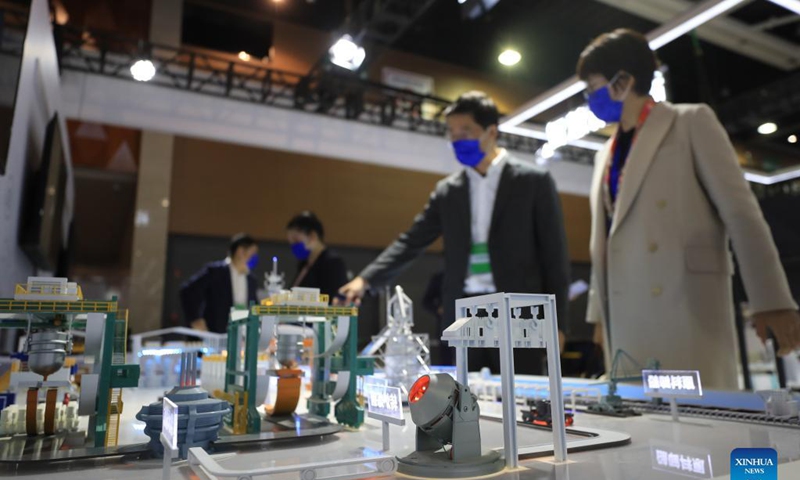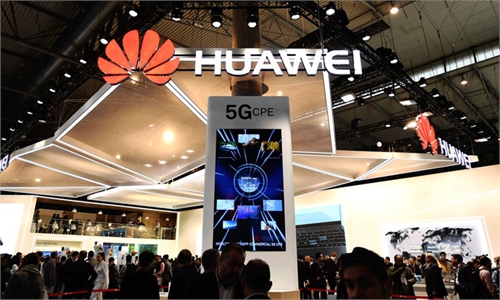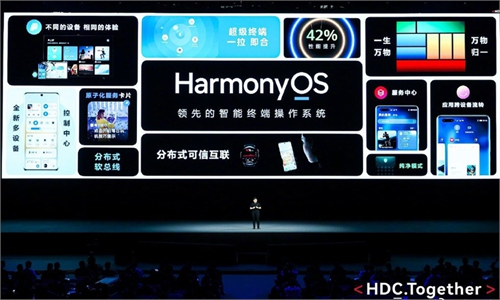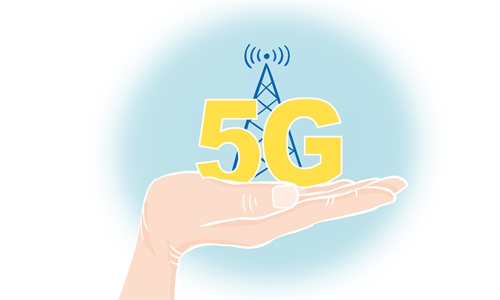News analysis: Huawei forges ahead in new direction as forced transformation takes shape

Participants visit the booth of Huawei Technologies Co., Ltd. at an auxiliary exhibition during the 2021 Global Industrial Internet Conference in Shenyang, capital of northeast China's Liaoning Province, Oct. 18, 2021. The 2021 Global Industrial Internet Conference kicked off here on Monday.Photo: Xinhua
"Black technology," brainstorming lectures, programming labs, free drinks and snacks, decorative balloons, and music festivals... the 2021 Huawei Developer Conference (HDC), also its biggest event each year held in the warm southern city of Dongguan over the weekend, makes it hard for me to imagine that the company is still struggling and suffering major setbacks under US sanctions.
Developers, media, students, analysts and Huawei fans, known as "huafen" from across the country, are invited to gather at Huawei's massive campus, which can reportedly house up to 25,000 employees. The massive campus is designed to mimic different major European cities.
Huawei's staffers enthusiastically introduced and demonstrated the company's latest technologies during the three-day event. Discussions are intense, cooperation deals are piling up, and only through some posters hanging in the lecture rooms can I sense that the company is facing a tough time.
"You are in a race against time, your dedication is needed now more than ever," read a poster in one of the buildings.
Reality is cruel, though. The US' stranglehold chip ban has already put a juddering halt to its rise as the world's biggest smartphone maker, and resulted in a slide of its smartphone market shares both at home and abroad - and those shares are still dropping.
What's worse, the telecommunications firm, known for its strength in 5G, can only launch 4G smartphones now, as it's losing its edge in the very competitive industry. Its telecommunications equipment sales in overseas markets are also suffering - some countries have called for removing its products, and others are creating increasing barriers for it, citing so-called national security risks.
"Huawei is still seeking survival" has been the most frequently heard phrase from its executives during all kinds of flagship events, as well as analysts and experts, over the past two years.
The survival-seeking Huawei was forced to transform itself from being a hardware manufacturer to a software provider. Its self-developed operating system HarmonyOS is breaking a path in the operating system market, where there is a duopoly of Google's Android and Apple's IOS.
"HarmonyOS, we made it!" Richard Yu Chengdong, the firm's rotating chairman was thrilled to announce on his Weibo account, China's Twitter-like social media on Saturday, marking a phased success to the firm's "forced" transformation, and pointing to a clear path for the firm.
"The future has traces to follow," is also the slogan of this year's HDC.
Yu said the self-developed OS, which was publicly released after being banned from using Google's services, has already attracted 1.5 billion users, the fastest pace ever for any OS in the world.
It might be still too early to say whether HarmonyOS is a success, but there's no doubt that it's the first time that the US has experienced such strong resistance when using its "idiomatic tricks" on a firm to maintain its hegemony in the economic and technology fields.
But the difficulties also appear to be inspiring hard work and, more importantly, confidence among employees.
On Friday, I saw tons of Huawei staff leaving their offices at around 11 pm. "That's normal, you can also see Huawei staff pouring out after 3 am in the morning," a taxi driver told me.
"They are rich and working 'desperately'," the driver said.
Some Huawei employees told me that they still believe Huawei will regain lost ground globally, and their confidence comes from the firm's years of research input and cumulative experience, and beating foreign rivals.
I'm still cautious over whether the firm can still lead the future and win the battle with US tech giants, but I can feel its story is now inspiring more firms in China to join the fight. Perhaps more foreign firms could follow suit to break the US monopoly together.
That will bring change to the future, and make technology truly work for all and for good.




